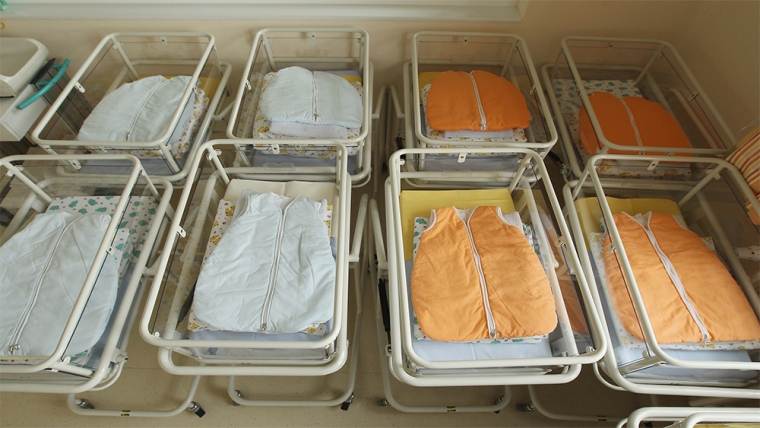
Both global and domestic population growth has featured in the news lately and with the planet bursting at the seams with people, population always makes an interesting study. New Zealand food producers should be more aware than most about how this macro influencer of demand is trending.
In developing countries, notably China and South-East Asia, the increasing middle class has been a major driver of demand for NZ products and up until recently this middle-class growth has been under pinned by a solid population base (good or bad).
However, recently the trends are showing that the population base is looking less secure, or at least the birth rate supporting the population base is. Japan has long been known to have a falling population driven down by the lower birth rate initially, continuing now increasing with an ageing population dropping off at the other end of the scale. Peaking at 128.5 million in 2011, it is now down to 126.5 million.
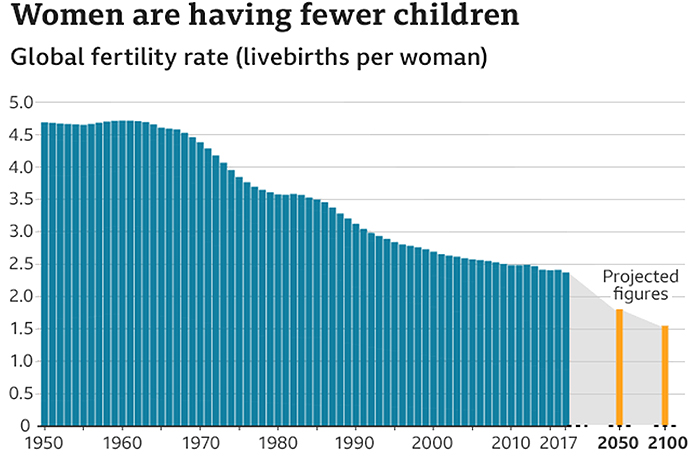
China’s population growth has also hit a road bump with the infertility rate rising faster than expected. A new reproductive study showed one out of every 5.6 couples of childbearing age in China is unable to make a baby despite frequently having unprotected sex for at least a year. The infertility rate has grown from 12% in 2007 to 18% in 2020. This is ahead of the global rate of infertility which has increased from 11% in 1997 to 15.4% in 2018. It is largely driven by the increase in the average age that couples first try to have a baby, as well as increasingly unhealthy lifestyles and environmental pollution.
The graph below shows just how China’s birth rate has fallen. Going from a peak of 30 million new babies per year in the 1960’s to just 13 million in 2020 and continuing to drop.
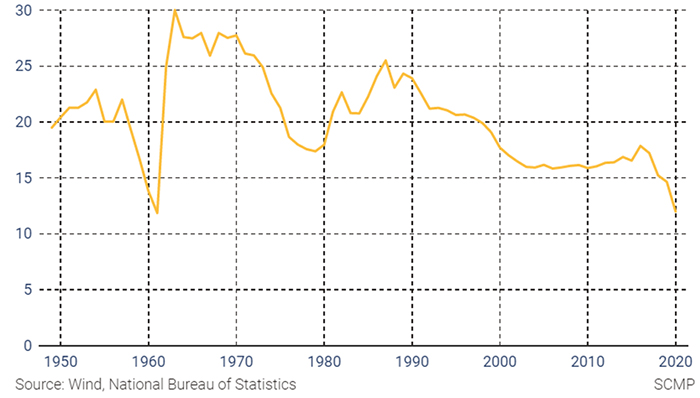
Falling fertility rates mean nearly every country could have shrinking populations by the end of the century.
At least on paper, 23 nations, including Spain and Japan, are expected to see their populations halve by 2100. Japan's population is projected to fall from a peak of 128 million in 2017 to less than 53 million by the end of the century. Italy is also expected to see an equally dramatic population crash from 61 million to 28 million over the same timeframe.
They are two of 23 countries - which also include Spain, Portugal, Thailand and South Korea - expected to see their population more than halve.
China, currently the most populous nation in the world, is expected to peak at 1.4 billion in four years' time before nearly halving to 732 million by 2100. India will take its place as #1.
With the current focus being on economic growth, immigration will continue to be seen as a means to provide workers etc. to stoke the fires of economies. However, as is being seen in New Zealand there is a growing dissatisfaction with this policy especially when it means there is increasing competitions for domestic resources. When many countries have falling populations, then competition for ‘favourable’ migrants will increase and the size of queues wanting to enter ‘new’ countries are likely to decrease.
Some countries are trying policies such as enhanced maternity and paternity leave, free childcare, financial incentives and extra employment rights, but with limited uptake. Given the global problems of overusing natural resources, having a shrinking population does not seem such a bad option. However, the United Nations predictions are still that overall the global population will increase (currently at about 80 million per year) peaking in 2100 at 10.9 billion before the global decrease begins.
Much of the increase comes from growth in the African continent with five of the most populous 10 countries, bolstered by India. The potential growth or fall in population is precarious with small changes in predictions leading to quite different outcomes by 2100. The ranges generally fall between a high of 12.7 billion to a low of 9.4 billion, with 10.9 billion as being near the mid-point.
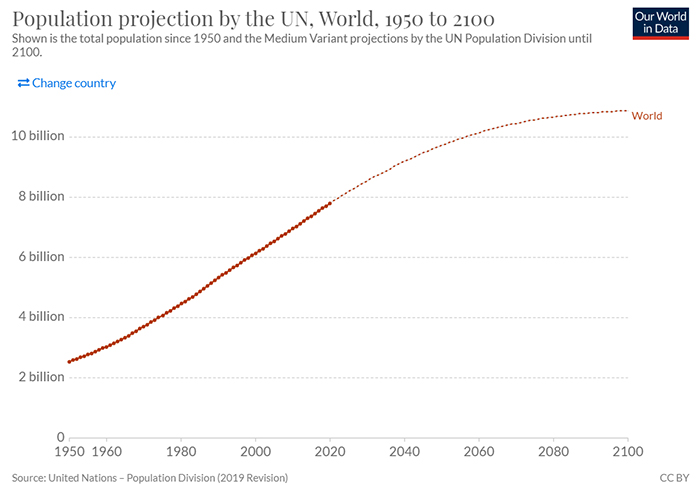
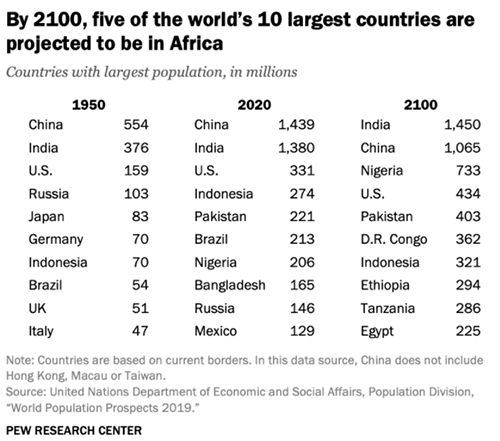
Looking specifically at NZ, the current birth rate is 12.377 births per 1000 people, a 0.69% decline from 2020, which in turn was a 0.69% decline from 2019. Despite this reduction in birth rate the UN still predicts the NZ population will reach six million by 2100. This is based upon at least some continuing immigration taking place (an average of 25,000 per year) plus being aided by an ageing population. (This does differ from Statistics NZ figures).
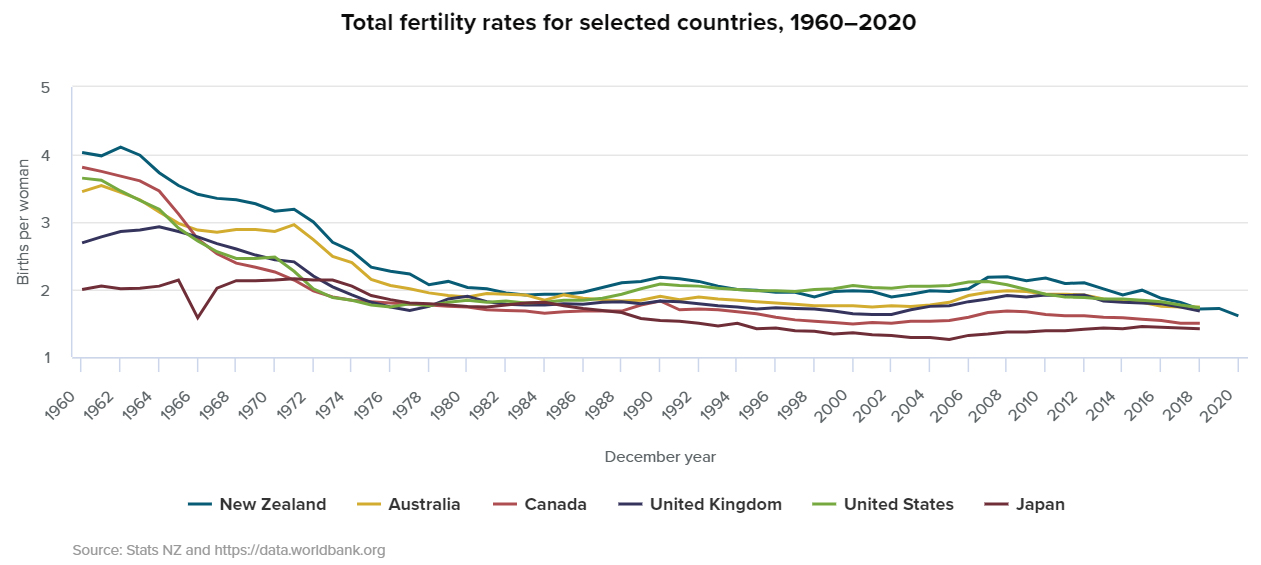
The largest reduction in birth rate took place in women in their 20s. While the other age groups remain at similar levels, the previous high weighting of the 20s age group had a large impact on current reductions.
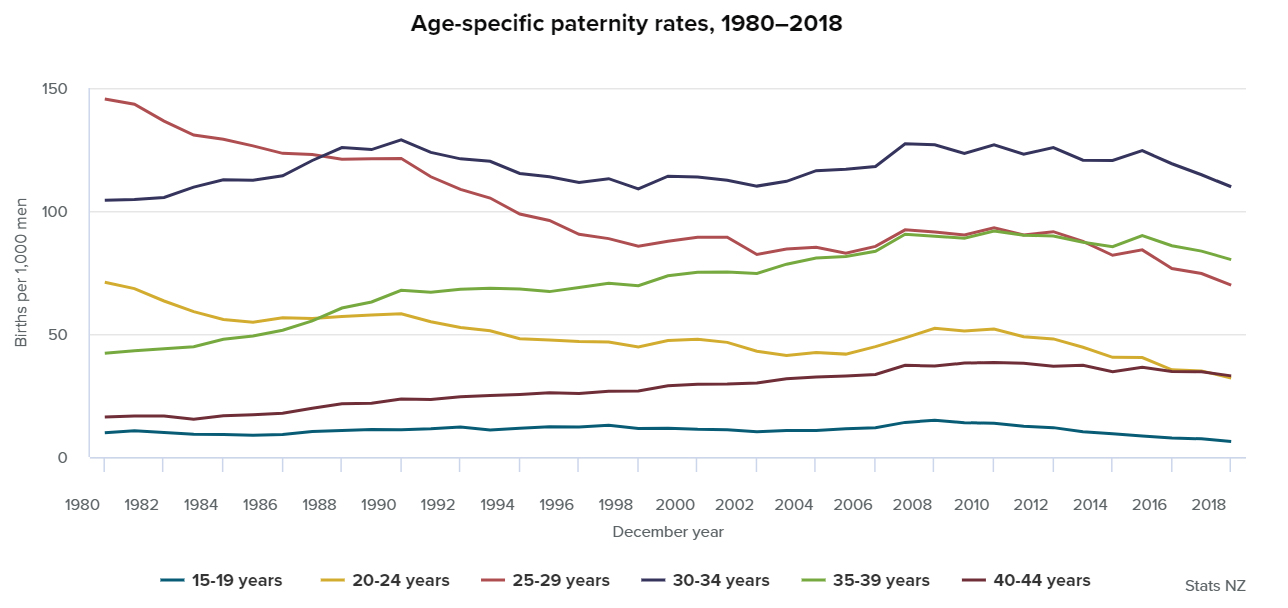
According to Stats NZ if there was no migration in or out from now, the NZ population would peak in 2040 at 5.4 million and then rapidly decline as the ageing population died off and were not replaced. It would then be around five million (again) in 2073. On the other hand if we go forward at a rate of a net 50,000 migrants per year (in 2019 we had 56,000 net migrants similar to Australia and well ahead per capita of either the UK or USA) then the population will be closer to seven million by 2073. As the graph below shows NZ has generally high rates and probably it is not a surprise the rate climbs under a National government then falls again under Labour (allowing for some lag time).
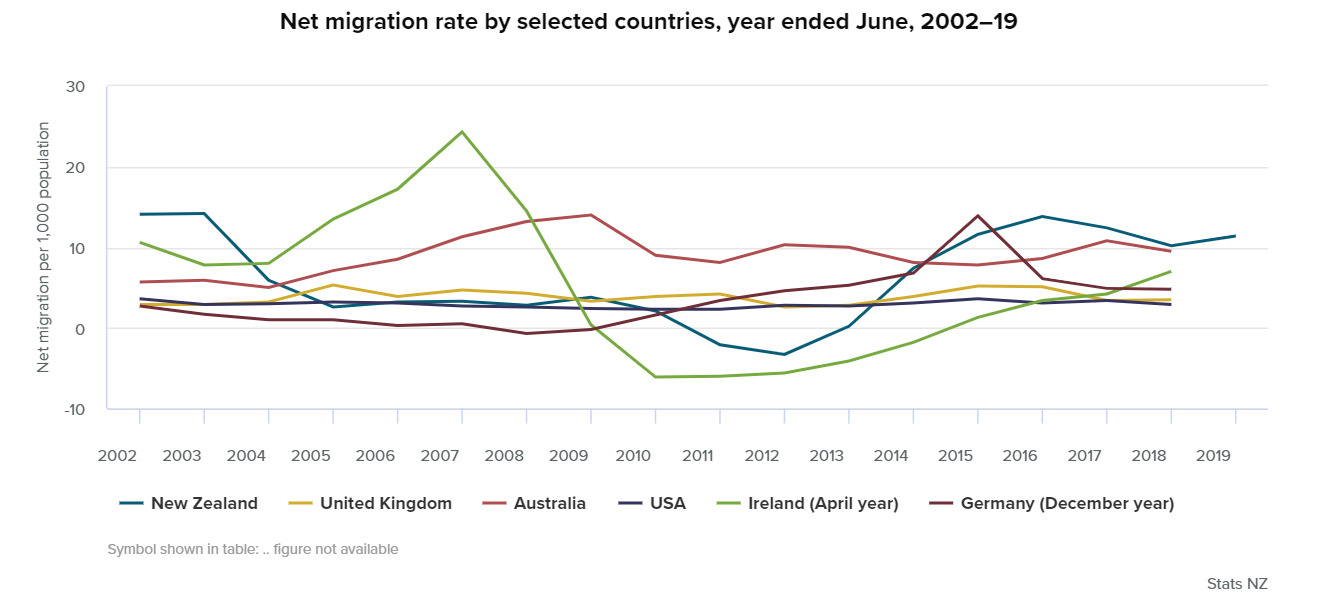
NZ does appear to treat its immigrants well. An OECD paper from 2019 showed that immigrants in NZ tend to have better well-being outcomes than those living in other OECD countries. Compared with immigrants in other countries, NZ immigrants rank in the top third of OECD-country immigrants for well-being outcomes in the areas of education, employment, poverty and having a say in government. The same report found little evidence that immigrants negatively affect either the wages or the employment opportunities of the average NZ-born worker.
The only evidence of negative impacts of recent migrants on wages of the NZ-born is when the relative skill composition of recent immigrants is increased. This has a small negative effect on the wages of high-skilled NZ-born people offset by a positive effect on wages of the medium-skilled NZ-born. However, temporary migration has had small negative impacts on new hires of some groups of people, notably social welfare beneficiaries not in the (16) most urbanised areas.
The same and other reports also found immigration had little positive gains on the economy. Most New Zealanders heading off-shore tend to end up in Australia. Digging a little deeper into the education attainment of the NZ-born population in Australia, there appears to be something of a ‘trades drain’. The share of the NZ-born population aged 15 and over with post-secondary qualifications below university degree level is higher in Australia than in NZ. By contrast, the share of the NZ-born with a Bachelor’s degree or higher is similar in Australia and NZ.
Immigration however, while not impacting negatively on wages, must have an impact on housing and access to other resources (health and education) which have failed to keep up with NZ’s population growth.
NZ with its still relatively small population has the opportunity about just how much population growth it desires. The current government is talking about resetting the immigration criteria (along with tourism) and one thing COVID-19 has done is buy some breathing space to rethink just how big we want our population to grow.
No chart with that title exists.
58 Comments
The overall birth rate of a country disguises the huge difference in birth rate among different ethnic groups.
And this will have far greater impact on a society than the overall birth rate.
For example, the US, as we know it, was founded when 100% of its folks were white (ppl who had the right). Would the US be the same US when less than 50% of its folks were white? A question everyone is aware but refuses to answer.
Same applies to many countries in EU and many others that we will not name here.
Perhaps Hispanics will simply be absorbed into the 'white' mainstream, similar to how Italians and Irish have been in the past. Both were discriminated against in the not too distant past.
The US has had 'other' cultures as part of the mix for their entire history and every now and then another group gets assimilated into the mainstream.
14 US states already have white populations below 60%
Why that matters unless you're doing identity politics
It's not ethnicity that worries me, it's the socio economic, educational standard, work ethic, skills, intellect of the breeding group. Many of those popping out numerous babies are at the very bottom.
If you want to be depressed, go have chat with a mid wife or A&E nurse about their clientele.
Those babies are sponsored, there are more benefits to be had. If you are working it gets harder to pull off as you, well.. you know.. have to work.
Indeed. The state sponsored breeding programme.
Only way to find out is to for the whites to return to where they came from and then do a comparison with the remaining Native Americans once they have access to the resources taken from them. Of course it will be difficult to replant century old forests that were cut down or return natural recourses back into the ground or oceans or plains. However, some formula could be used to factor in the difference caused by depleted resources.
The definition of White has changed and will keep changing. It used to exclude Irish and Catholics and then Italians and certainly Jews. In Britain after a mere 70 years of Caribbean immigration they are well on their way to being assimilated. Not so a similar number of Muslims. The arguments about the benefits of diversity and the need for equality forgets that different cultures are different - if they weren't then why bother thinking about culture.
In the UK a curry is now the most popular restaurant food; taking over from the Jewish invention 'Fish & Chips' and before that wasn't it tea from China? Some things assimilate and others don't such as the French eating horsemeat, arranged marriages with dowries, FGM, etc.
As an outsider it seems obvious that the nearest culture to a white American is a black American and vice versa. Seeing everything in terms of race and ethnicity is a recent concept that has filled the vacuum left by the demise of religion.
Look at the NZ immigration rate. Highest in the world.
There are far too many people in the world so this is a good trend.
I am sure that the lack of secure housing and cost of living are very significant factors in this fall.
I wonder if that is the master plan. Make life difficult for young families so that they will have less kids? Terrible if that is the case.
Looks like Ireland managed to peak at 2.4%? Crazy. Probably largely explains their property market crash, too.
You mean legal immigration rate and apply it to a longish period (we certainly compare badly to the Lebanon with its recent 5m refugees). But our legal immigration for the last 70 years has been the highest and especially more recently. Doesn't seem to have done us much good overall. Worthwhile having a public discussion and retuning our immigration policy. However I expect our govt will only listen to the loudest most desperate employers and ignore the rest of us.
if you want a lot of kids now you might have to join a cult,there hasnt been a lot of well paid secure jobs since the douglas reforms in the 80s.if we have millions to help landlords to buy new houses maybe we could give a little to help mothers to welcome a new baby or two.like france where you get a medal and an invite for lunch with the mayor.
Gloriavale is disintegrating at the moment. Seems they don't have secure well-paid jobs either, or at least ones that aren't worth the personal sacrifices being made.
If you want a lot of kids you just go on the benefit. It pays more than a real job once you have more than 2 kids. Bonus money if you are a single parent rather than just unemployed. And Jacinda already introduced payments to have more babies. The poorer you are, the more money you get. How's that for an incentive?
https://www.ird.govt.nz/situations/i-am-having-a-baby
Ha. I got pilloried last night suggesting that.
Looks like the blip in the net NZ immigration was a response to the drastic fall in our fertility rates- which is absolutely rational and wise.
We need more babies that will be become future hard working tax payers instead of generational welfare recipients. There should be a long term study on the outcomes of babies developing into adulthood to measure the quality of the country's offsprings.
Without good research data, the country continues to fly blind and there is no way to formulate policies or have any form of quality intervention. We may be producing way more garbage than productive members of the society for years without anyone noticing except when MSD charts ran out of scale.
the conclusion could not be more obvious but any discussion is prohibited in the current political environment.
xingmowang you are talking a lot of sense today. Is it the anniversary that's doing it? :)
watch it live on youtube. grand firework show as well.
1 July , 100th birthday for the CCP.
Congratulations, the figures on moving the Chinese population out of poverty are very impressive. There are a host of real human right issues that need addressing but economically the CCP has been successful.
Less so when compared to Taiwan.
do hope you get a chance to visit both places instead of watching their twisted image from your 40inch box.
Yes - Congratulations its all going the the great plan?
The pressure for academic success has played a part in 25% of Chinese adolescents suffering from depression, versus 13% of their American peers. As the kids grow into young adults, the immense societal expectation to succeed has led to a counter culture of self-professed 'losers' or Diaosi. A somewhat related trend has come from youth exhausted by a culture of hard work with seemingly little reward who push for a lifestyle change by "lying flat".
These numbers and cultures clearly aren't pleasing the powers in Beijing. This isn't just because they are looking out for the wellbeing of the populace, but also because this has contributed to over two-thirds of couples reluctant to bring more than one child into the world. Hence we have the well-publicised baby drought that is impacting China's demographic balance, competitiveness and happiness. The stark reality is that nearly a sixth of China’s children and teenagers will have no brothers, sisters, uncles, or aunts by 2050.
Superannuation and accomodation supplement are the greatest welfare in this country and end up in the pockets of boomers and landlords. To cleanse our society of unproductive non-taxpaying garbage superannuation should be means tested and the accomodation supplement should be scrapped.
Brock I did not pick you for a member of the equivalency of outcome brigade. The origins of Super is a pre-pay model, recipients have already paid into a scheme and are due a return. Calling it a benefit, while factually true, misses this important context. For the long-term unemployed we have benefits. For those that decide to have/can have children there are benefits. The accommodation supplement exists due to our long-term world-beating immigration levels, the RMA, our building supply cartel, our clumsy RBNZ, the lack of Capital Gains tax on property etc. Scrapping it would be easy but we will run out of motels.
Current Super is a pay as you go benefit not a paid onto scheme. End of.
20 years ago the NZ Super fund was set up. "The NZ Super Fund is a New Zealand Government savings vehicle to help pre-fund the future cost of universal superannuation." It has performed well since then and now has NZD $59,000,433,423.00 in it for us to use to support the super payments.
I am not disagreeing it is a benefit, just that you are kidding yourself if you think that paying the people the constructed all the infrastructure of the country through their taxes and hard work is a benefit in the same manner as the long-term unemployed or the accommodation benefits.
"constructed all the infrastructure of the country through their taxes and hard work" - can you give us a example of this?
So we don't need the cash in the NZ Super fund to pay super in the future.
Don't tell Robbo he has a cycle bridge he's looking to pay for.
Totally agree- if Muldoon had not scuppered NZ's retirement fund with his Cossacks adverts in the 70s, then it would have remained a scheme - and we'd have one as wealthy as Australia's.
Are you trying to suggest that recipients of New Zealand's superannuation scheme have paid $350k in taxes, above and beyond the taxes required to service the country, as part of their superannuation? $20k per year until life expectancy of 82, or 43 years worth of PAYE for a $50k p.a. wage earner. There was an opportunity for them to start "paying in" to a scheme in the 1970s, much like Kiwisaver, but they didn't want to fund their own retirement instead relying on the next generations to foot the bill.
In 1898 the New Zealand government introduced a means-tested old-age pension for those 65 years and older.[12] This established some key features of public pensions in New Zealand, such as the use of general government spending rather than individual contributions, and a "pay as you go" rather than an actuarial approach to funding.[13]
Means testing Super will pour money into the pockets of lawyers and accountants. Don't forget my Super is taxed so the more I earn the more it is taxed. If you want to give the retired less money then shift the retirement age - it has been done in other countries.
A worker pays taxes throughout their working life, they may choose to save for their retirement or not. When they retire they get some taxpayer money back as Super or if they don't qualify for super they get various accommodation and other special benefits - we simply don't live in a country that is willing to let elderly people starve in the streets.
BTW after buying food and clothing very little of my Super remains - it is not a luxury lifestyle - just try it yourself for a few weeks.
B L,
"to cleanse our society of unproductive non-taxpaying garbage". Though 76, I still pay tax at 33% and every pensioner I know is a tax payer.
I find your language offensive, but from the posts I have seen, it fits your character.
IMO that UN world population projection isn't going to end up even close to that.
Do you think it is too high, or too low?
Too high.
They'd better sort the ducks.
Either scenario has significant impacts.
If we don't need all this food it plays well into farm animal reduction as per the IPCC.
If we do need food due to population increases there's going to a lot of famine.
If all the growth is in Africa, while the rest of the world keeps providing aid its going to perpetuate the increases.
You know you get the behavior you incentivise
Having taken up surfing in the last couple of years this sport offers a good insight into the unintended consequences of too many people. That is both immigrants and tourists. The think with waves is we can't grow more to match the increase in population. What is happening now is our most popular spots are insanely overcrowded and competition for waves leads to violence. Police have to patrol the most popular spots in an effort to keep the peace.
I've personally been pushed off my surfboard by a "local" that thought I wasn't from the area. I didn't take offence as I can understand his frustration. There were punch ups on the beach that same day.
The logic that seems to go in this country(and the world really) is that since we are spoiled for such uncrowded surfing conditions we could make more money if we promoted it and brought in more surfers.
I've been in a spot where there are 50 surfers when it could really accommodate 3-4 in the conditions. I've spoken to old timers that got to experience those sorts of numbers in the 1970's. Interestingly I've seen comment that Hawai was overcrowded in the 1960's.
20 years ago I was hearing stories of similar degradation of their sport from a back country trout fisherman.
Whatever natural resources you enjoy in New Zealand it is only a matter of when overpopulation affects you.
As a late starter to surfing I wonder why I waited to long, it really is exhilerating. I've managed to ride a wave 12' tall, and a couple of times now have had 600m rides. This on top of my sport of Waka Ama I get to experience the positive brain chemicals flooding my system on a regular basis. The feeling of contentment after a day on the water is really something.
Not generally much of a break at Hawai is there. ;) Can be in very specific swells.
Great illustration.
Aussie is definitely a good place for tradies to make a buck.
Hell yes, no comparison, and being more culturally respected as a profession to boot.
In June 2001 New Zealand had a population of 3.8m, 20 years later we have a population of 5.2m. Let's set our 2041 population goal back at 3.8m.
We could have affordable housing, transport infrastructure could just be maintained, we could easily meet our environmental goals, be very comfortable in retaining our food supply...
Well finally a comment on the biggest challenge facing NZ rural sector - forget about regs, carbon, trees etc etc - this will drive the biggest change. Read this article for some science and facts.
https://farmersweekly.co.nz/section/agribusiness/view/regions-face-decl…
How is many parts of rural NZ going to fair with a 5- 30% reduction in working age people in the next 10 to 20 years?
There are no people left to do work - they will be needed to look after old people.
Competition for bright young ones is getting tougher every day
Immigration wont solve this issue - its not a problem its called reality.
Note the last comment in the article.
Especially when rural provinces like Southland and the West Coast already have similar population densities to Lapland.
Go and live on the coast for a while as I did for twelve years. The remoteness and lack of crowds of people were exactly what made it so good.
I'm not saying it is bad just very difficult to source labour/services. I've done isolated to heaving metropolis and enjoyed the lot. Though the lack of healthcare in sparse regions is always a challenge.
Yes, and in news today Rockit Apples proudly announces how its new orchards in Gisborne will create more new jobs in Gisborne- whilst missing the memo that Gisborne's working age population is likely to shrink by about 15% in the next decade..just as those trees need picking!
It is not PC to remark on but pakeha having considerably fewer babies than other ethnicities.
hence the ethnic make up of NZ is being transformed and no one is asked if they like this or not, because that is not something to be "consulted" on
Who would have thought the mantra- if you can't feed em don't breed em - might have caught on.
In reality the whole makeup of NZ is changing. We should be grateful for any children. The key out of this report is the main urban areas will grow while remoter rural areas will die. You only have to look at Europe, Russia, USA et etc Italy is forecasting over 5,000 small villages will disapear in the next 10 to 15 years. Schools and maternity wards are closing there as well. Demographics is the driver of this change there and here.
The difference in birth rates in some parts of the world compared to others, has nothing to do with race or ethnicity and everything to do with whether or not women have any control of their own fertility and lives, and nothing more.
Check the Stats NZ tables my friend.
The differential applies here
See below
2008-17 pakeha birth rate down 20%
Same for Maori
Pasifika down about 25%
Asian up 20%
Not info news is keen on handing out to us
Plus goes against common prejudice re poor in S Auckland
GFC explains it
People cannot afford as many kids - esp in poorest groups
Who is having fewer or more kids in nz
https://figure.nz/chart/9tLV8dlA9h3iKNrl
"The same report found little evidence that immigrants negatively affect either the wages or the employment opportunities of the average NZ-born worker."
Pull the other one.
The average Kiwi - not worried about them. What about the below average? My two daughters and my wife earn above average (say $60k) but one daughter earns about $40k as does her husband and my son is in and out of employment at roughly the living wage. The employers in his industry are desperate to bring in a flood of subservient immigrants. Low wage immigration hurts low paid Kiwis. How often do we have to say it? It is obvious to the poor searching for work and it is also the general opinion of academic economists - it is just our elite politicians, media and businessmen who deny the obvious. They want ever cheaper services and ever increasing population.
Well I've failed at many things but I've done my part on this. I had five and so far they've had 9, almost there. And they are all above the mean household income though by choice only just as they all appear to only want to be comfortable not rich or collect things, so have backed off the work. Slackers.
Everyone else needs to try harder. ;)

We welcome your comments below. If you are not already registered, please register to comment
Remember we welcome robust, respectful and insightful debate. We don't welcome abusive or defamatory comments and will de-register those repeatedly making such comments. Our current comment policy is here.